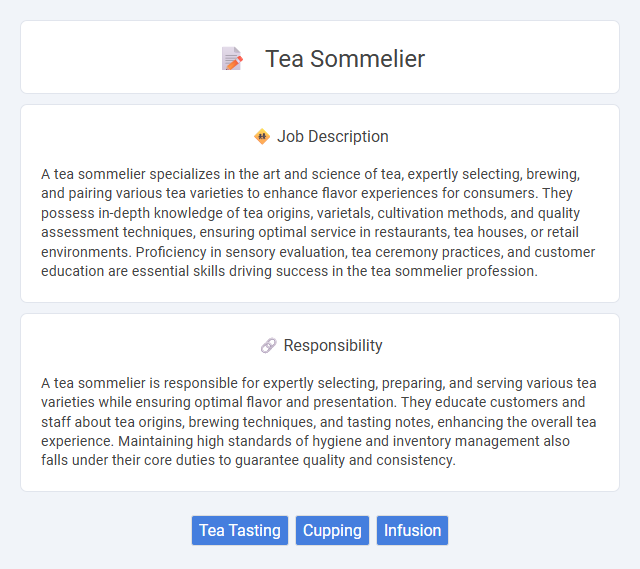
A tea sommelier specializes in the art and science of tea, expertly selecting, brewing, and pairing various tea varieties to enhance flavor experiences for consumers. They possess in-depth knowledge of tea origins, varietals, cultivation methods, and quality assessment techniques, ensuring optimal service in restaurants, tea houses, or retail environments. Proficiency in sensory evaluation, tea ceremony practices, and customer education are essential skills driving success in the tea sommelier profession.
Individuals with a refined palate and strong sensory awareness are likely to excel as tea sommeliers, as the role demands acute taste discrimination and a deep understanding of tea varieties. Those who enjoy continuous learning and possess patience and attention to detail may find this career suitable, given the need to identify subtle flavor profiles and brewing techniques. People who prefer dynamic social interactions and have good communication skills might be better suited for this job, as tea sommeliers often guide tastings and educate clients.
Qualification
A Tea Sommelier must possess in-depth knowledge of tea varieties, cultivation regions, processing methods, and tasting techniques to expertly assess flavor profiles. Professional certification from recognized institutions such as the Tea Association of the USA or the International Tea Masters Association is essential to validate expertise. Strong sensory evaluation skills combined with experience in tea service and pairing enhance their ability to recommend and curate tea selections effectively.
Responsibility
A tea sommelier is responsible for expertly selecting, preparing, and serving various tea varieties while ensuring optimal flavor and presentation. They educate customers and staff about tea origins, brewing techniques, and tasting notes, enhancing the overall tea experience. Maintaining high standards of hygiene and inventory management also falls under their core duties to guarantee quality and consistency.
Benefit
A tea sommelier job likely offers the benefit of developing specialized knowledge in tea varieties, brewing techniques, and flavor profiles, enhancing both personal expertise and professional credibility. This role may also increase opportunities for career advancement in hospitality, wellness, or retail industries due to the growing global appreciation for tea culture. Earning potential and networking with tea producers and connoisseurs could further contribute to the job's appeal.
Challenge
A tea sommelier likely faces the challenge of mastering an extensive variety of tea types and understanding their unique flavor profiles. The role probably demands continuous learning about tea cultivation, processing methods, and cultural significance to provide expert recommendations. Managing customer preferences and educating clients on tea nuances may also present ongoing challenges.
Career Advancement
A Tea Sommelier specializes in the expert selection, tasting, and pairing of teas, requiring deep knowledge of tea varieties, cultivation, and brewing techniques. Career advancement opportunities include roles such as Tea Educator, Quality Control Manager, or Beverage Director, often found in high-end hotels, specialty tea companies, and luxury restaurants. Certification from recognized institutions like the Tea Association of the USA can significantly enhance professional credibility and open doors to international consulting and brand ambassador positions.
Key Terms
Tea Tasting
Tea sommeliers specialize in tea tasting by expertly evaluating and distinguishing flavors, aromas, and the quality of various teas. Their skill set includes identifying subtle notes and terroirs, crucial for pairing teas with food and enhancing customer experiences. Expertise in steeping techniques and sensory analysis allows tea sommeliers to guide consumers and businesses in selecting premium tea varieties.
Cupping
A tea sommelier specializes in the art of cupping, a methodical tasting process used to evaluate the flavor profiles, aromas, and quality of different tea leaves. Expert cupping requires a refined palate to detect subtle notes such as floral, fruity, or earthy undertones, and to assess the balance, body, and aftertaste of each sample. Mastery of cupping techniques enables a tea sommelier to recommend optimal brewing methods and pairings, enhancing the overall tea experience.
Infusion
A tea sommelier specializes in the art and science of tea infusion, expertly selecting and brewing tea leaves to achieve optimal flavor profiles and aroma. Mastery of infusion techniques involves controlling water temperature, steeping time, and leaf quantity to enhance the extraction of essential oils and antioxidants. Expertise in infusion allows the tea sommelier to guide customers through diverse tea experiences, highlighting nuances between white, green, oolong, black, and herbal teas.
 kuljobs.com
kuljobs.com